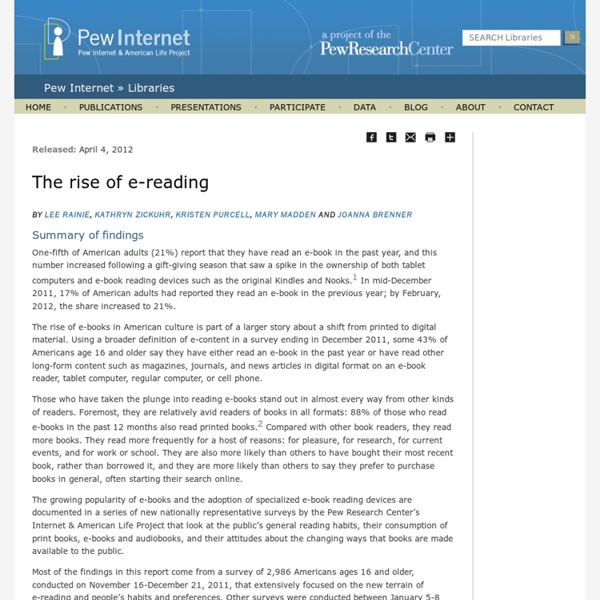Want to Engage? Just Ask! | 658.8 – Practical Marketing for Public Libraries
En/gage: a) to hold the attention of: <her work engages her completely> b) to induce to participate: <engaged the shy boy in conversation> If you are using social media to simply broadcast information about programs and events, you’re missing a huge opportunity to hold the attention of your community and to induce their participation. Social media is all about engagement. Via Facebook, Twitter, and other social platforms you can speak directly to your community, start public conversations, and build relationships. You’ve probably heard this all before and thought, “That sounds good, but I have no idea where to start!” One of the easiest ways to move from broadcasting to engaging is by asking questions. Book-related questions tend to get the most responses: What are you reading? We go beyond books, too: Oscars are tonight, what’s your pick for best pic? We get personal: What’s the best library program you’ve ever attended?
Don't Be Nice; Be Helpful - Peter Bregman
Ron* was up next. As a senior analyst in this investment firm — and a good one — he knew a lot about the company he was about to pitch to the management committee. He paused for a minute as he sorted through the pages of numbers in front of him and then he began to present his case. Even though Ron described himself as a numbers guy, he seemed to really enjoy this part of his job. He was meticulous in presenting his ideas and took pride in the depth of his analysis. Twenty minutes later, as the meeting ended, Laurie, the head of the firm, thanked him for his work, specifically remarking on his exhaustive research. Everyone filed out except Laurie and me. “Oh my goodness,” she said, “What’s the best way to handle an analyst who drones on and on?” “Who?” “He’s a great analyst, a smart investor, and a really nice guy. “But you told him he did a great job!” “His analysis was great. “Have you told him?” “I’ve hinted but no, not specifically.” “Why not?” “I probably should.” But she hasn’t. Silence.
Movers & Shakers 2012
April 10, 2014 Library Journal Library News, Reviews, and Views You are here: Home / People / Movers & Shakers 2012 / Movers & Shakers 2012 Movers & Shakers 2012 By LJ on March 13, 2012 This article was published in Library Journal. Filed Under: Careers, Featured, Future of Libraries, LJ in Print, Managing Libraries, Movers & Shakers 2012 Tagged With: Movers & Shakers 2012 Related Articles: Trackbacks What I’m Reading (weekly) « Wearing 500 Hats says: March 17, 2012 at 8:44 pm [...] Recent & Popular INFOdocket by Gary Price Advertisement Job Zone LJ for iPad About Library Journal On Twitter Tweets by @LibraryJournal On Facebook LJ Resources Top of Page Copyright Library Journal © 2014
A Tale of Two Students
Meet Michael. In June, he graduated from a high school where he was encouraged to use his own technology for teaching and learning, and to connect to the district’s Wi-Fi network, where he shared almost complete open internet access on school- and personal-learning devices while on campus. The district’s guidelines for appropriate conduct are delineated in the student code of conduct. During his high school career, Michael was encouraged to communicate and collaborate with his classmates and friends using the communication tools that best served their needs. Through curricular projects, Michael learned how to use social media to increase his productivity and learning. He is fully aware of his digital persona, and while he hasn’t consciously molded it to “look good” to a college admissions officer or prospective employer, it does. Now, meet Jessica who is entering 11th grade in one of the 12 largest school districts in the United States.
Declaration for the Right to Libraries - Text Only | Advocacy, Legislation & Issues
Declaration for the Right to Libraries In the spirit of the United States Declaration of Independence and the Universal Declaration of Human Rights, we believe that libraries are essential to a democratic society. Every day, in countless communities across our nation and the world, millions of children, students and adults use libraries to learn, grow and achieve their dreams. In addition to a vast array of books, computers and other resources, library users benefit from the expert teaching and guidance of librarians and library staff to help expand their minds and open new worlds. We declare and affirm our right to quality libraries -public, school, academic, and special – and urge you to show your support by signing your name to this Declaration for the Right to Libraries. LIBRARIES EMPOWER THE INDIVIDUAL. LIBRARIES SUPPORT LITERACY AND LIFELONG LEARNING. LIBRARIES STRENGTHEN FAMILIES. LIBRARIES ARE THE GREAT EQUALIZER. LIBRARIES BUILD COMMUNITIES. LIBRARIES STRENGTHEN OUR NATION.



